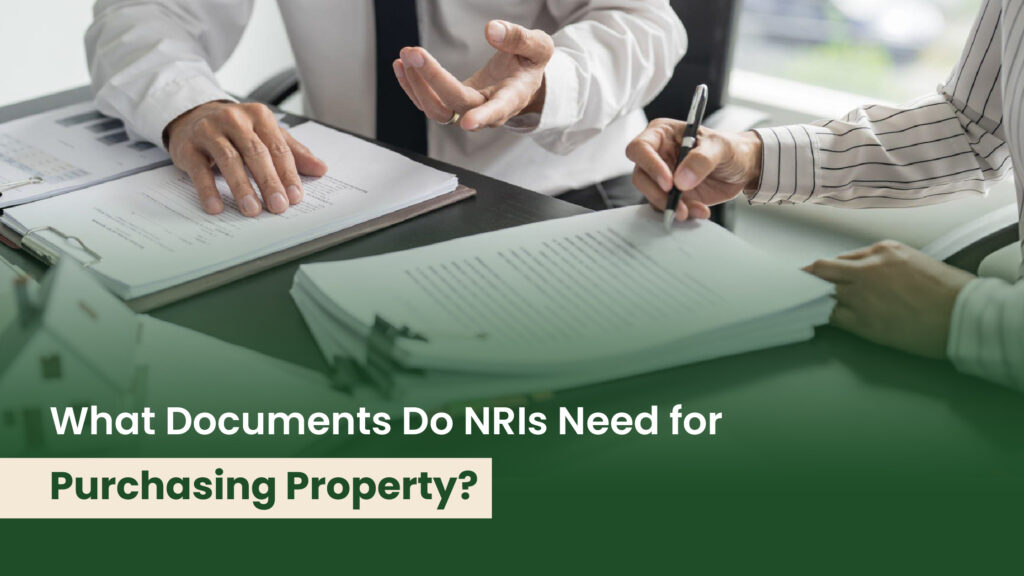
Investing in NRI property has become increasingly popular as more Non-Resident Indians seek to own a piece of their homeland. Whether it’s for personal use, rental income, or long-term investment, purchasing property in India as an NRI involves several important steps — including gathering the right documents. Understanding what paperwork is required can save time, avoid legal troubles, and make the buying process smoother.
If you are an NRI planning to invest in real estate, knowing the necessary documents is crucial. This blog will guide you through the key papers needed when purchasing property, so you can approach the process confidently and securely.
Who is an NRI?
A Non-Resident Indian (NRI) is an Indian citizen who usually lives outside India. They stay abroad for more than 180 days in a year, usually because of employment, business, or settling in another country.
What are the guidelines for an NRI to buy property in India?
NRIs should be aware of the Indian government’s regulations before buying property in India. These rules explain what types of properties they can buy, how payments should be made, and how ownership can be transferred. The following guidelines make these legal points easier to understand, helping NRIs make well-informed decisions.
Criteria for eligibility
NRIs and Persons of Indian Origin (PIOs) can buy property in India, but not agricultural land, plantation land, or farmhouses.
Purchase
NRIs can buy residential or commercial property in India from Indian citizens, other NRIs, or Overseas Citizens of India (OCIs), as per the rules set by the government.
Gift:
NRIs can be gifted residential or commercial properties by their relatives, whether they are Indian residents, or other OCIs. But this doesn’t cover farmland, farmhouses, or plantation properties.
Inheritance
NRIs can inherit any kind of property in India from a person who lived in the country or legally owned it.
What documents do NRIs need for purchasing property?
Handling the paperwork can feel overwhelming, and it’s easy to get confused about what you need. Every NRI property buyer must gather certain important documents. These are also reviewed by banks before approving a home loan. The main property documents include:
Indian Passport / PIO Card / OCI Card
To buy property in India, you need a valid Indian passport issued by the Ministry of External Affairs. Passports come in different types—blue, white, diplomatic, and orange. The blue passport is usually given to regular Indian citizens.
If you hold a foreign passport, you’ll need a Person of Indian Origin (PIO) card. This card is for individuals who once had an Indian passport or have parents, grandparents, or great-grandparents who were born and lived in India.
If you’re not an Indian citizen but were eligible to become one before or after the partition—or if your parents were—you might need an Overseas Citizen of India (OCI) card. You can apply for an OCI or PIO card, or get help from the nearest Indian Embassy. You might also be asked to provide your parent’s birth certificates to prove your eligibility.
PAN card
A PAN card (Permanent Account Number) is a unique ID number given to people who pay taxes in India. To get a PAN card, you’ll need to provide documents like proof of identity, passport, and others. You can register for it both online or offline.
NRIs need a PAN card if they rent out property in India, since it’s needed to file income tax. If they sell the property in the future, the profit will be counted as part of their income and taxed.
Passport size photographs
Indian law requires both the buyer and the seller to provide passport-size photos at the time of NRI property registration. So, make sure to carry your passport-size photographs along with the other necessary documents.
Power of attorney
A Power of Attorney (POA) is a legal document that lets you choose someone to handle your property matters for you. With a POA, another Indian citizen can complete the property purchase or sale on your behalf.
You need to sign the POA in front of a consular officer or notary public in your home country. If you give Power of Attorney to someone in the city where you’re buying property, it makes the registration process quicker and smoother. It also helps complete the sale and transfer ownership smoothly. This is especially useful if you don’t visit India often.
Address Proof
Address proof shows where you currently live, so you need to provide a document that proves your current address. These can include your utility bills, passport, PIO card, or OCI card.
NRIs can use funds from their non-resident accounts or money sent from abroad to pay for property purchases.
Important Takeaway
NRIs looking to purchase property in India have many investment options, each with different financial goals and levels of risk. It’s important for them to understand the benefits of investing and do careful research to make smart decisions.
With the right effort and information on the best way to buy property, NRIs can find properties in India that offer good returns and profits. To make the process easier, you can reach out to Rustomjee today and take advantage of our specialized services for NRIs.
